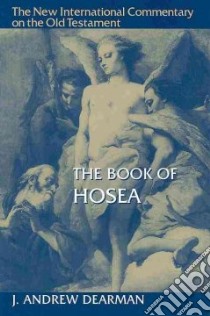The Book of Hosea - 9780802825391
Un libro in lingua di Dearman J. Andrew edito da Eerdmans Pub Co, 2010
- € 40.20
- Il prezzo è variabile in funzione del cambio della valuta d’origine
Someone once said, "The past is another country ù they do things differently there." At times, indeed, the Old Testament resembles another very different country. Maneuvering through levitical laws, bloodshed in Joshua, or Daniel's apocalyptic visions, sincere readers often wonder what the Old Testament means and how it can be the Word of God. For several decades The New International Commentary On The Old Testament has helped countless people traverse this difficult literary terrain.
This premier commentary series enjoys a worldwide readership of scholars, pastors, priests, rabbis, and serious Bible students. They eagerly consult its high-quality volumes to inform their preaching, teaching, and academic research, and they warmly welcome each newly published volume as they would an encounter with a stimulating new friend. Through the rigorous yet reverent study contained in these commentary volumes, readers hear afresh the voice of the living God speaking his powerful word.
All of the NICOT volumes combine superior scholarship, an evangelical view of Scripture as the Word of God, and concern for the life of faith today. Each volume features an extensive introduction treating the biblical book's authorship, date, purpose, structure, and theology. The author's own translation of the original Hebrew and verse-by-verse commentary follow. The commentary itself carefully balances coverage of technical matters with exposition of the biblical text's theology and implications.
Readers who want to hear God's voice anew through Scripture will find The New International Commentary On The Old Testament to be a faithful, trustworthy guide for helping them navigate the strange other country we call the Old Testament.
In this solid theological commentary on the book of Hosea, J. Andrew Dearman considers the prophetic figure's historical roots in the covenant traditions of ancient Israel, includes his own translation of the biblical text, and masterfully unpacks Hosea's poetic, metaphorical message of betrayal, judgment, and reconciliation.
"A welcome addition to the NICOT series on one of the most important prophets of ancient Israel. The introduction is especially helpful on Hosea's use of metaphors and similes, and readers will not be disappointed with Dearman's thorough and penetrating exegesis."ùBill T. Arnold, Asbury Theological Seminary
"Hosea's complexities begin with translation and extend to its rich use of imagery. Andrew Dearman brings his considerable skills as a Hebraist and historian and his expert literary and theological sensitivities to bear on the interpretation of this important book. Serious engagement with the book of Hosea now starts with Dearman's commentary."ùTremper Longman III, Westmont College
"Dearman's commentary provides the most recent deep engagement with the ancient text of Hosea the prophet. Dialoguing with the best of scholarship, Dearman offers both detailed exegesis of the text with accompanying translation from the original Hebrew and general overviews at key literary junctures to orient the reader to the progressive development of the book as a whole. Particularly helpful is Dearman's sensitivity to the social context of ancient Israelite households. He restores the vivid metaphorical colors of the book of Hosea long faded by history. This is a welcome addition to the NICOT series."ùMark J. Boda, McMaster Divinity College McMaster University
"The book of Hosea is pound for pound as difficult a prophetic book as one can find in the Bible, so we appreciate the work of J. Andrew Dearman in this extraordinary commentary...Dearman captures well the metaphorical theology of Hosea, and his thoughtful reflection on the text attends to the various issues of every passage in the book. In his appendices he guides the reader through ten topics that dominate Hosea scholarship. Readers will consistently appreciate Dearman's clear and succinct writing style. Reading this commentary is a treat."ùStephen B. Reid, Baylor University
Informazioni bibliografiche
- Titolo del Libro in lingua: The Book of Hosea
- Lingua: English
- Autore: Dearman J. Andrew
- Editore: Eerdmans Pub Co
- Collana: Eerdmans Pub Co (Hardcover)
- Data di Pubblicazione: 03 Agosto '10
- Genere: RELIGION
- Pagine: 408
- ISBN-10: 0802825397
- EAN-13: 9780802825391


